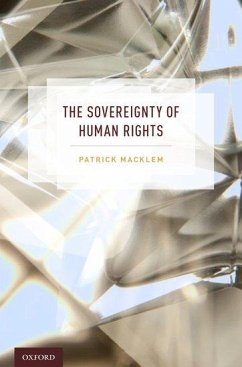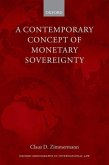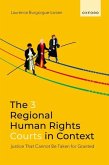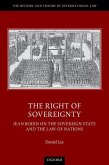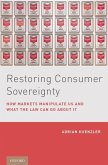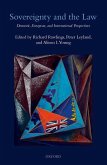Patrick Macklem
Sovereignty of Human Rights
Patrick Macklem
Sovereignty of Human Rights
- Gebundenes Buch
- Merkliste
- Auf die Merkliste
- Bewerten Bewerten
- Teilen
- Produkt teilen
- Produkterinnerung
- Produkterinnerung
The Sovereignty of Human Rights advances a legal theory of international human rights that defines their nature and purpose in relation to the structure and operation of international law.
Andere Kunden interessierten sich auch für
![Contemporary Concept of Monetary Sovereignty Contemporary Concept of Monetary Sovereignty]() Claus D ZimmermannContemporary Concept of Monetary Sovereignty177,99 €
Claus D ZimmermannContemporary Concept of Monetary Sovereignty177,99 €![Sovereignty and the New Executive Authority Sovereignty and the New Executive Authority]() Sovereignty and the New Executive Authority177,99 €
Sovereignty and the New Executive Authority177,99 €![The 3 Regional Human Rights Courts in Context The 3 Regional Human Rights Courts in Context]() Laurence Burgorgue-LarsenThe 3 Regional Human Rights Courts in Context214,99 €
Laurence Burgorgue-LarsenThe 3 Regional Human Rights Courts in Context214,99 €![Human Rights in Transition Human Rights in Transition]() Human Rights in Transition138,99 €
Human Rights in Transition138,99 €![The Right of Sovereignty The Right of Sovereignty]() Daniel LeeThe Right of Sovereignty141,99 €
Daniel LeeThe Right of Sovereignty141,99 €![Restoring Consumer Sovereignty Restoring Consumer Sovereignty]() Adrian KuenzlerRestoring Consumer Sovereignty161,99 €
Adrian KuenzlerRestoring Consumer Sovereignty161,99 €![Sovereignty and the Law Sovereignty and the Law]() Sovereignty and the Law179,99 €
Sovereignty and the Law179,99 €-
-
-
The Sovereignty of Human Rights advances a legal theory of international human rights that defines their nature and purpose in relation to the structure and operation of international law.
Hinweis: Dieser Artikel kann nur an eine deutsche Lieferadresse ausgeliefert werden.
Hinweis: Dieser Artikel kann nur an eine deutsche Lieferadresse ausgeliefert werden.
Produktdetails
- Produktdetails
- Verlag: Oxford University Press
- Seitenzahl: 272
- Erscheinungstermin: 17. September 2015
- Englisch
- Abmessung: 236mm x 155mm x 25mm
- Gewicht: 476g
- ISBN-13: 9780190267315
- ISBN-10: 0190267313
- Artikelnr.: 47864061
- Herstellerkennzeichnung
- Libri GmbH
- Europaallee 1
- 36244 Bad Hersfeld
- gpsr@libri.de
- Verlag: Oxford University Press
- Seitenzahl: 272
- Erscheinungstermin: 17. September 2015
- Englisch
- Abmessung: 236mm x 155mm x 25mm
- Gewicht: 476g
- ISBN-13: 9780190267315
- ISBN-10: 0190267313
- Artikelnr.: 47864061
- Herstellerkennzeichnung
- Libri GmbH
- Europaallee 1
- 36244 Bad Hersfeld
- gpsr@libri.de
Patrick Macklem is the William C. Graham Professor of Law at the Faculty of Law, University of Toronto, and a Fellow of the Royal Society of Canada. He is a recurring Visiting Professor at Central European University. In 2006-2007, he was a Senior Global Research Fellow at the Center for Human Rights and Global Justice at NYU School of Law. In 2007-2008, he was a Member of the Institute for Advanced Study at Princeton, New Jersey. He is the author and editor of numerous books and articles on international human rights law, constitutional law, and indigenous peoples and the law.
Acknowledgments
1. Field Missions
Human Rights as Moral Concepts
Human Rights as Political Concepts
Human Rights as Legal Concepts
The Plan of the Book
2. Sovereignty and Structure
Sovereignty and its Exercise
Between the National and International
Sovereignty and its Distribution
3. Human Rights: Three Generations or One?
Generations as Chronological Categories
Generations as Analytical Categories
Civil and Political Rights as Monitors of Sovereignty's Exercise
Social and Economic Rights as Monitors of Sovereignty's Exercise
4. International Law at Work
Labor Rights as Instrumental Rights
Labor Rights as Universal Rights
Labor Rights and the Structure of International Law
5. The Ambiguous Appeal of Minority Rights
The Moral Ambiguities of Minority Rights
The Political Ambiguities of Minority Rights
The Interdependence of Sovereignty and Minority Protection
6. International Indigenous Recognition
Indigenous Territories and the Acquisition of Sovereignty
Indigenous Recognition and the International Labour Organization
Indigenous Recognition and the United Nations
The Purpose of International Indigenous Rights
7. Self-Determination in Three Movements
Self-Determination and the Legality of Colonialism
The Many Paradoxes of Self-Determination
Bridging International Law and Distributive Justice
8. Global Poverty and the Right to Development
The Emergence of the Right
Implementing the Right
From Global Poverty to International Law
The Right to Development and the Rise and Fall of Colonialism
Bibliography
Index
1. Field Missions
Human Rights as Moral Concepts
Human Rights as Political Concepts
Human Rights as Legal Concepts
The Plan of the Book
2. Sovereignty and Structure
Sovereignty and its Exercise
Between the National and International
Sovereignty and its Distribution
3. Human Rights: Three Generations or One?
Generations as Chronological Categories
Generations as Analytical Categories
Civil and Political Rights as Monitors of Sovereignty's Exercise
Social and Economic Rights as Monitors of Sovereignty's Exercise
4. International Law at Work
Labor Rights as Instrumental Rights
Labor Rights as Universal Rights
Labor Rights and the Structure of International Law
5. The Ambiguous Appeal of Minority Rights
The Moral Ambiguities of Minority Rights
The Political Ambiguities of Minority Rights
The Interdependence of Sovereignty and Minority Protection
6. International Indigenous Recognition
Indigenous Territories and the Acquisition of Sovereignty
Indigenous Recognition and the International Labour Organization
Indigenous Recognition and the United Nations
The Purpose of International Indigenous Rights
7. Self-Determination in Three Movements
Self-Determination and the Legality of Colonialism
The Many Paradoxes of Self-Determination
Bridging International Law and Distributive Justice
8. Global Poverty and the Right to Development
The Emergence of the Right
Implementing the Right
From Global Poverty to International Law
The Right to Development and the Rise and Fall of Colonialism
Bibliography
Index
Acknowledgments
1. Field Missions
Human Rights as Moral Concepts
Human Rights as Political Concepts
Human Rights as Legal Concepts
The Plan of the Book
2. Sovereignty and Structure
Sovereignty and its Exercise
Between the National and International
Sovereignty and its Distribution
3. Human Rights: Three Generations or One?
Generations as Chronological Categories
Generations as Analytical Categories
Civil and Political Rights as Monitors of Sovereignty's Exercise
Social and Economic Rights as Monitors of Sovereignty's Exercise
4. International Law at Work
Labor Rights as Instrumental Rights
Labor Rights as Universal Rights
Labor Rights and the Structure of International Law
5. The Ambiguous Appeal of Minority Rights
The Moral Ambiguities of Minority Rights
The Political Ambiguities of Minority Rights
The Interdependence of Sovereignty and Minority Protection
6. International Indigenous Recognition
Indigenous Territories and the Acquisition of Sovereignty
Indigenous Recognition and the International Labour Organization
Indigenous Recognition and the United Nations
The Purpose of International Indigenous Rights
7. Self-Determination in Three Movements
Self-Determination and the Legality of Colonialism
The Many Paradoxes of Self-Determination
Bridging International Law and Distributive Justice
8. Global Poverty and the Right to Development
The Emergence of the Right
Implementing the Right
From Global Poverty to International Law
The Right to Development and the Rise and Fall of Colonialism
Bibliography
Index
1. Field Missions
Human Rights as Moral Concepts
Human Rights as Political Concepts
Human Rights as Legal Concepts
The Plan of the Book
2. Sovereignty and Structure
Sovereignty and its Exercise
Between the National and International
Sovereignty and its Distribution
3. Human Rights: Three Generations or One?
Generations as Chronological Categories
Generations as Analytical Categories
Civil and Political Rights as Monitors of Sovereignty's Exercise
Social and Economic Rights as Monitors of Sovereignty's Exercise
4. International Law at Work
Labor Rights as Instrumental Rights
Labor Rights as Universal Rights
Labor Rights and the Structure of International Law
5. The Ambiguous Appeal of Minority Rights
The Moral Ambiguities of Minority Rights
The Political Ambiguities of Minority Rights
The Interdependence of Sovereignty and Minority Protection
6. International Indigenous Recognition
Indigenous Territories and the Acquisition of Sovereignty
Indigenous Recognition and the International Labour Organization
Indigenous Recognition and the United Nations
The Purpose of International Indigenous Rights
7. Self-Determination in Three Movements
Self-Determination and the Legality of Colonialism
The Many Paradoxes of Self-Determination
Bridging International Law and Distributive Justice
8. Global Poverty and the Right to Development
The Emergence of the Right
Implementing the Right
From Global Poverty to International Law
The Right to Development and the Rise and Fall of Colonialism
Bibliography
Index

